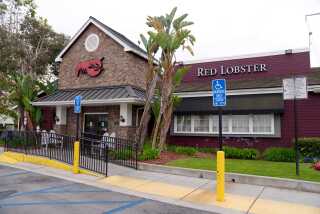Carl Karcher Enterprises Slimming Down : Restaurants: Fast-food chain sheds operations, pares corporate staff to cut annual costs $10 million.
- Share via
ANAHEIM — Carl Karcher Enterprises, the parent of the Carl’s Jr. fast-food chain, is on a corporate diet.
In recent months, the Anaheim-based company shed a food-processing business, eliminated an investment banking operation and trimmed back its internal store maintenance department. The cuts resulted in 60 corporate staff layoffs that will slash annual operating costs by about $10 million.
Karcher also told investors to expect a $5-million net loss for the fourth quarter of 1992, contrasted with a $13-million profit a year earlier. The market has responded favorably to Karcher’s new, lean look. Karcher’s stock closed up 12.5 cents Wednesday at $8.625 in NASDAQ trading.
The company, which owns 379 restaurants and franchises in an additional 244 locations, has more weight to lose. But Donald E. Doyle, Karcher’s new president and chief executive, believes the company is headed in the right direction. “Our objective was to end up with our stock price a couple points north of neutral, and that’s been the case,” Doyle said.
Doyle, 46, received explicit marching orders when he joined the company in early January. The Karcher board, which in December spurned a leveraged buyout offer, told the former president of Louisville-based KFC to “aggressively” deal with operating costs so the company could “realize its full (profit) potential.”
So far, the internal, corporate restructuring hasn’t focused on how the public perceives Carl’s Jr. But Doyle has started to focus on consumer attitudes. And, as was the case inside corporate headquarters, the chain is likely to be placed on a diet as the parent company tries to bolster revenue.
“Our ‘mantra’ . . . is doing a few things very well . . . making sure we don’t get our resources so diffused in trying to do so many different things that we don’t do any very well,” Doyle said.
To start, Doyle wants to “rationalize the menu . . . make the menu a little cleaner or less confusing to the customer.”
Potatoes are but one menu item that could be cut back. All Carl’s Jr. locations offer a variety of baked potatoes, but many stores aren’t selling enough spuds to cover costs. Rather than simply carrying items on the menu, Doyle intends to “prune” slow-moving items to cut costs and make room for new offerings cooked up in the chain’s test kitchen.
Doyle won’t tinker with Carl Jr.’s image as a purveyor of quality charbroiled hamburgers and chicken sandwiches. Carl’s Jr. won’t slash prices in order to bolster sales because its board believes that there is a solid market for “premium, quality . . . fast food,” Doyle said.
Doyle acknowledged that Carl’s must offer food--like the 99-cent Happy Meals--that meets the growing customer demand for better “values.” But he also maintained that investors would be ill-served if Carl’s Jr. simply slashed prices in a bid to build market share.
Karcher does expect more bang for its advertising buck.
Past advertising has made consumers “very aware” that Carl’s Jr. restaurants peddle tasty food, Doyle said, but the advertising “has not been as successful in terms of helping us generate same-store sales growth.”
No decisions have been made, but Karcher founder and Chairman Carl N. Karcher may not continue as the chain’s spokesman. “If (ads) use Carl or his personality, then that’s great,” Doyle said. But if the company determines that advertising is more effective without the founder’s participation, “then that’s fine, too,” Doyle said. “That’s very consistent with the way Carl is looking at (advertising).”
Karcher remains active in the company’s day-to-day business despite having turned the chief executive’s title over to Doyle. Karcher is the major holder of Carl Karcher Enterprises stock, but the board in December rebuffed his attempt to buy back the company’s outstanding shares. Doyle was named president and chief executive officer after that failed buyout attempt.
“One of my challenges is getting here earlier than him,” Doyle said. “He’s real active . . . and obviously, as a major shareholder, we value his advice and counsel. But it’s also been made very clear that he and the board selected me as CEO and that they’re looking for me to run the company.”
More to Read
Inside the business of entertainment
The Wide Shot brings you news, analysis and insights on everything from streaming wars to production — and what it all means for the future.
You may occasionally receive promotional content from the Los Angeles Times.










